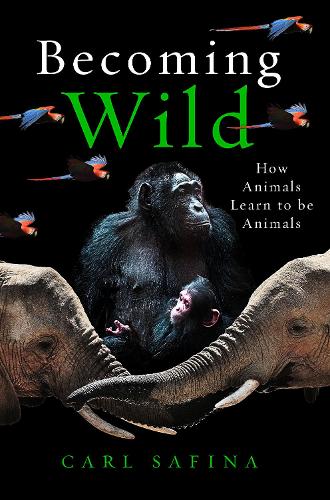
Becoming Wild: How Animals Learn to be Animals
(Hardback)
Available Formats
Hardback, Large Print Edition
Published: 16th December 2020
Paperback
Published: 31st May 2022
Hardback
Published: 2nd July 2020
Publishing Details
Becoming Wild: How Animals Learn to be Animals
By (Author) Carl Safina
Oneworld Publications
Oneworld Publications
2nd July 2020
United Kingdom
Classifications
General
Non Fiction
Zoology and animal sciences
Animals and society / Animal rights - issues and debates
Evolution / Evolutionary biology
590
Physical Properties
Hardback
384
Width 153mm, Height 234mm, Spine 34mm
Description
The first humans learned to craft weapons so that they could hunt for food in order to survive. If this learning was part of human culture in the hunter-gatherer era then it is a part of chimpanzee culture, too. Evidence of culture, long thought the exclusive purview of humankind, is abundant in the animal kingdom. Carl Safina travels the world to reveal the remarkable discoveries ofleading researchers studying communities of creatures in the wild. Fromsperm whales in Dominica, who can communicate with twenty-two different codas, to dolphinsin the Bahamas who learn to babysit one another, these are elements of life on Earth largely unexplored. The Nurture in Nature enriches our understanding of the creatures with whom we share this planet, eroding the boundaries that stand between us.
Reviews
[A] bracing and enlightening book Safinas writing on the watery depths and its denizens is sublime [challenging] us to be more acutely aware of species whose social lives have much to teach us.
-- SCIENCEIn this superbly articulate cri de coeur, Safina gives us a new way of looking at the natural world that is radically different.
-- Washington PostSafina, the ecologist and author of many books about animal behavior, here delves into the world of chimpanzees, sperm whales and macaws to make a convincing argument that animals learn from one another and pass down culture in a way that will feel very familiar to us.
* New York Times, 100 NOTABLE BOOKS OF 2020 *A smorgasbord of compelling details . . . Becoming Wild could easily become a television series.
* Fortean Times *Fascinating [Becoming Wild] gives the reader a sense of being near these creatures and experiencing some of the most seductive environments on Earth Safinas prose achieves the elusive goal of being both informative and luminously evocative.
* Wall Street Journal *Carl Safina combines his passion for the natural world with absorbing, sometimes breathtaking prose, transporting us into the intimate, nuanced worlds of some of the planets most charismatic beings.
-- Jonathan Balcombe, author of What a Fish KnowsEloquent This revelatory work sheds as much light on what it means to be human as it does on the nature of other species.
-- Publishers WeeklyFew readers will doubt that these magnificent creatures need urgent attention. Enthralling.
-- Kirkus, starred review[Safina] turns the human view of animal cultures on its headBecoming Wilddemands that we wake up and realise that we are intrinsically linked to our other-than-human neighbours.
* Telegraph *Dr. Safina is a terrific writer, majestic and puckish in equal measure.
* New York Times *[Safina] is a font of research, his wonder contagious.
* Elle *Safina puts forward several eye-opening and previously-overlooked implications of animal culture a pleasure to read another jewel in the crown of Safinas work that packs fascinating field studies, interesting theoretical ideas, soul-searching questions, and probing reflections on human and animal nature into a book that is as profound as it is moving.
* Inquisitive Biologist *Author Bio
Carl Safina is an award-winning science writer whose previous books include Song for the Blue Ocean and Beyond Words. He has written for the Guardian, New York Times, TIME and National Geographic, among others. He is the first Endowed Professor for Nature and Humanity at Stony Brook University, and founding president of the not-for-profit Safina Center. He lives on Long Island, New York, with his wife Patricia and their dogs and feathered friends.
